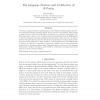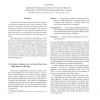145 search results - page 2 / 29 » A Scenario Description Language Based on Action Frame |
CORR
2011
Springer
12 years 11 months ago
2011
Springer
B-Prolog is a high-performance implementation of the standard Prolog language with several extensions including matching clauses, action rules for event handling, finite-domain c...
RE
2007
Springer
13 years 10 months ago
2007
Springer
In industrial requirements documents natural language is the main presentation means. In such documents, system behavior is specified in the form of scenarios, written as a seque...
ICCS
2005
Springer
13 years 9 months ago
2005
Springer
A machine learning technique for handling scenarios of interaction between conflicting agents is suggested. Scenarios are represented by directed graphs with labeled vertices (for ...
ATAL
2003
Springer
13 years 9 months ago
2003
Springer
Making it easier to design interactions between agents and humans is essential for realizing multi-agent simulations of social phenomena such as group dynamics. To realize large-s...
CAEPIA
2003
Springer
13 years 8 months ago
2003
Springer
Abstract. The following problem will be considered: from scattered examples on the behavior of a dynamic system induce a description of the system. For the induced description to b...


